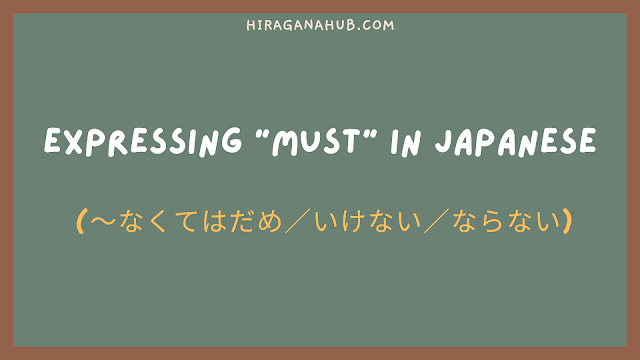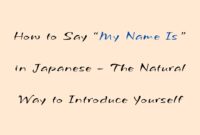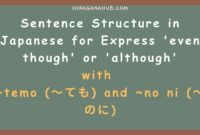If you want to learn Japanese online for free, understanding
how to express obligation is essential. In Japanese, saying “must” or “have
to” involves a double negative structure. This may sound tricky at first, but
once you grasp the pattern, it becomes quite simple!

Understanding the Double Negative
Unlike English, where “must” is a straightforward affirmative word, Japanese
expresses necessity using double negatives. This concept is similar to certain
phrases in other languages where “not and not” implies “must.”
To form this structure, take the negative form of a verb,
replace the final い (i) with くて (kute),
then add は (wa) followed by
だめ (dame), いけない (ikenai), or
ならない (naranai). Let’s break it down with examples:
| Verb (Dictionary Form) | Negative Form | Must (Full Form) |
|---|---|---|
| 書く (kaku) – to write | 書かない (kakanai) | 書かなくてはだめ (kakanakute wa dame) – Must write |
| 聞く (kiku) – to listen | 聞かない (kikanai) | 聞かなくてはいけない (kikanakute wa ikenai) – Must listen |
| 読む (yomu) – to read | 読まない (yomanai) | 読まなくてはならない (yomanakute wa naranai) – Must read |
| 泳ぐ (oyogu) – to swim | 泳がない (oyoganai) | 泳がなくてはだめ (oyoganakute wa dame) – Must swim |
| 勉強する (benkyou suru) – to study | 勉強しない (benkyou shinai) | 勉強しなくてはいけない (benkyou shinakute wa ikenai) – Must study |
| 来る (kuru) – to come | 来ない (konai) | 来なくてはだめ (konakute wa dame) – Must come |
Alternative Ways to Say “Must”
Japanese also has variations for expressing necessity using conditional forms
such as ば (ba) or と (to):
- 行かないとだめ (ikanai to dame) – Must go
- 話さなければなりません (hanasanakereba narimasen) – Must
speak - 寝ないといけません (nenai to ikemasen) – Must sleep
Common Abbreviations in Spoken Japanese
In everyday conversations, these phrases are often shortened for convenience.
Here are some common abbreviations:
| Full Form | Shortened Form |
| 書かなくてはだめ (kakanakute wa dame) | 書かなくちゃ (kakanakucha) |
| 聞かなくてはいけない (kikanakute wa ikenai) | 聞かなくちゃ (kikanakucha) |
| 読まなければなりません (yomanakereba narimasen) | 読まなきゃ (yomanakya) |
| 行かないとだめ (ikanai to dame) | 行かないと (ikanai to) |
These shortcuts are frequently used in casual speech, so mastering them will
make your Japanese sound more natural!
Summary
To say “must” in Japanese, you can use:
- ~なくてはだめ/いけない/ならない for standard
expressions - ~ないとだめ/いけない as an alternative
- ~なければならない/なりません for a more formal tone
- ~なくちゃ/なきゃ/ないと for casual conversations
Now that you’ve learned how to say “must” in Japanese, try forming sentences
with verbs you know. Let me know if you have any questions—happy studying!



